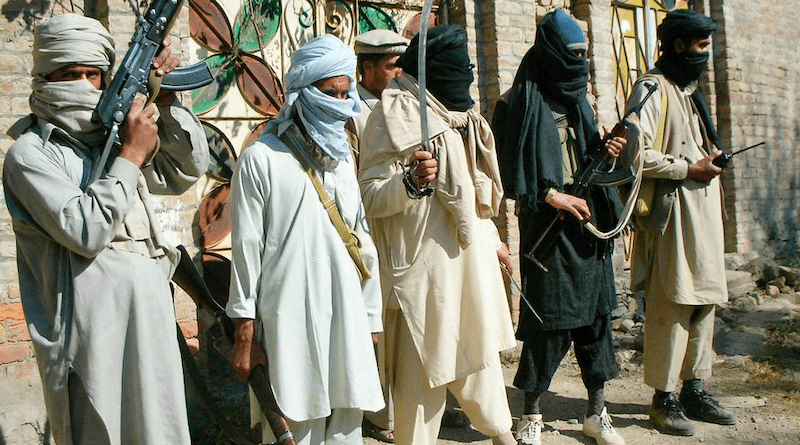Pakistan: Duplicity Of TTP Leadership – OpEd
By Dr. Sahibzada Muhammad Usman
The Tehrik-i-Taliban Pakistan (TTP) represents a convoluted paradigm of extremism that has both shocked and appalled the world with its notorious actions. Behind the veneer of religious advocacy and the veil of ideological warfare lies a leadership driven by personal gains, political maneuvering, and an utter disregard for the sanctity of human life. This article endeavors to shed light on the duplicitous nature of the TTP leadership, underpinned by a slew of traits that betray their purported noble intentions.
Perhaps the most glaring reflection of TTP leaders’ duplicity is their hands-off approach to warfare. Despite their relentless call to arms, advocating for a so-called ‘holy cause,’ these leaders are conspicuously absent from the battlefield. Renowned names within the TTP hierarchy, such as MNW, Mangal Bagh, Muhammad Khorasani, and Faqeer Muhammed, conveniently base themselves in Afghanistan. Simultaneously, their loyalists are thrust into the unforgiving battlegrounds of Pakistan, making the ultimate sacrifices in a war many deem futile.
Afghanistan has long been a sanctuary for TTP leaders, offering them a haven far removed from the gritty realities of the conflict they propagate. They relish the comforts and safety of their Afghan bases while their foot soldiers confront the brutalities of combat against the Law Enforcement Agencies (LEAs) in Pakistan. This opportunistic stance was further highlighted during the reconciliation process with the Government of Pakistan. Rather than genuinely seeking peace, TTP leaders saw it as an opportunity to strengthen their presence in Pakistan, concealing their true intentions behind the guise of dialogue.
For a group that frequently speaks of martyrdom and the sacredness of Jihad, the TTP leadership’s refusal to enter Pakistan’s fray speaks volumes about their true character. Recent assassinations of some top leaders in undisclosed circumstances further corroborate the narrative that these leaders are fearful of confronting the very war they champion.
Deceit and manipulation are the bedrock of TTP’s recruitment strategy. The leadership shamelessly exploits the vulnerabilities of impoverished Afghan nationals, luring them into their ranks with promises of religious rewards and martyrdom. This strategy flagrantly defies the SHU fatwa. Moreover, by recruiting these fighters for terrorist operations in Pakistan, the TTP serves a dual purpose. First, they boost their ranks with new recruits, and second, they strain the already fragile relations between the Intra-Afghan Government (IAG) and Pakistan.
Allegations and evidence pointing towards TTP leaders being in cahoots with external entities lend another layer to their deceptive character. These leaders, in their quest for power and money, seem to have bartered away their purported religious, ethical, and moral values. Their affiliation with foreign powers appears transactional, with these leaders willing to orchestrate violence and bloodshed against fellow Muslims in Pakistan at their patrons’ behest.
It’s no secret that the TTP leadership views its rank and file not as valued comrades, but as disposable assets. Recent events in Afghanistan, where a number of TTP leaders were killed, underscore this. The killings weren’t the result of enemy actions but stemmed from internal rifts and power struggles. The quest for dominance and resources often trumps any supposed brotherhood or shared ideological goal within the group. The friction between various factions of the TTP has become public knowledge. The media war between JuA and TTP paints a vivid picture of the depth of these internal conflicts. This power tussle not only reveals the opportunistic nature of the leadership but also foretells impending violence that, tragically, the foot soldiers will bear the brunt of.
While TTP leaders enjoy relative safety, they brainwash impoverished and innocent individuals, driving them to carry out suicide attacks. Ironically, these leaders and their immediate families are rarely, if ever, seen participating in these perilous missions. The rank and file, deceived by misinterpretations of religious scriptures, lay down their lives, while the leadership remains insulated from such sacrifices.
At its core, TTP is deeply tribalistic. Dominated by the Mehsood tribe, its objectives often align more with the tribe’s interests rather than any broader ideological or religious goal. Other affiliated groups and clans find themselves being used to further the Mehsood’s ambitions, sidelining their interests. Despite originating from the very soil, TTP leaders remain astonishingly disconnected from Pakistan’s religious, ethical, moral, and cultural ethos. They exploit vulnerable segments of the population through religious misinterpretation, coercion, and intimidation.
The Pakistani populace is increasingly aware of the TTP’s true motives, often referred to as their “Fasadi Agenda.” This awareness is a testament to the resilience of the Pakistani spirit and its inherent resistance to divisive forces. The Law Enforcement Agencies (LEAs), backed by the unwavering support of the Pakistani people, remain committed to ridding the nation of the scourge of terrorism. Their efforts, sacrifices, and determination reflect the nation’s unified stance against the likes of TTP. It’s imperative for Afghan nationals and the Intra-Afghan Government (IAG) to discern the malevolent strategies of TTP. Exploiting sentiments related to religion, ethnicity, and Pashtunwali, TTP seeks to further its own goals, often at the expense of Afghan interests.
Afghan refugees, having found a haven in Pakistan for over four decades, should remain wary of TTP’s deceptive propaganda. The warmth, shelter, and sincerity extended by Pakistanis deserve acknowledgment and should serve as a reminder of the bond that exists between the two brotherly nations.
The TTP leadership’s duplicitous nature stands exposed when one contrasts their words with their actions. Their modus operandi are rooted in self-preservation, opportunism, and exploitation. As they continue to play both sides for their gain, it is crucial for nations and their citizens to recognize these machinations and confront them head-on. The global community, and more importantly, the local populace, must be wary of the TTP’s divisive tactics. To stem the tide of extremism and counter the influence of groups like the TTP, there is a dire need for collective awareness, cohesive strategies, and unwavering determination. Only by challenging and debunking the false narratives can the world hope to neutralize the threat posed by such duplicitous entities.

